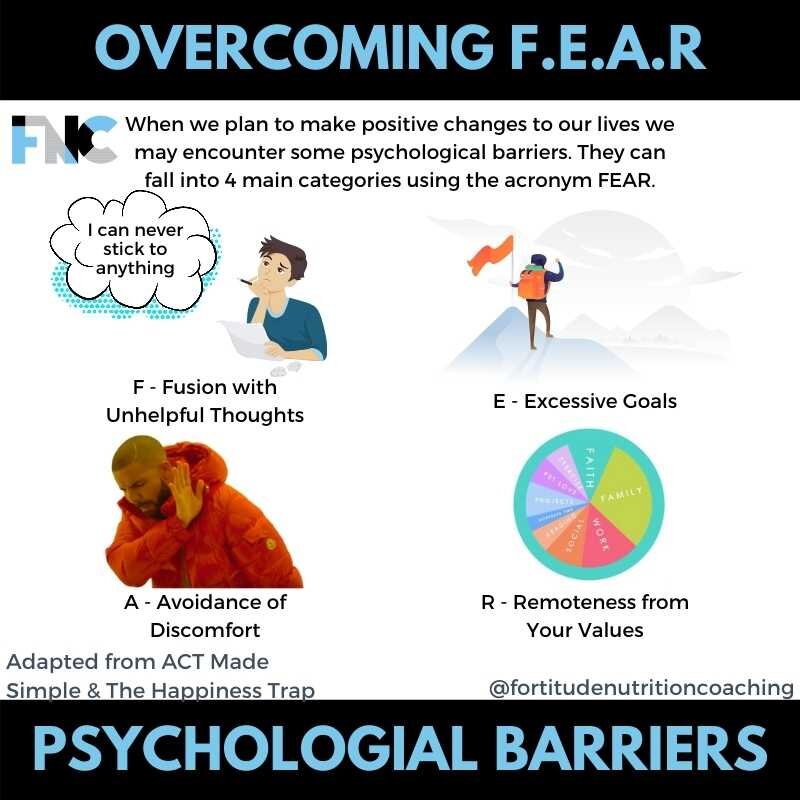How To Overcome Psychological Barriers
How often have you found yourself in this scenario?
You’ve set yourself a goal.
Found out what you need to do to achieve that goal.
Created an action plan.
You’re all set to start on Monday.
But then something stops you.
Something is holding you back.
Not physically, but mentally.
Quite often when we plan to make positive changes to our lives we encounter some psychological barriers.
We can categorise these psychological barriers into 4 main categories using the acronym FEAR.
F = Fusion with unhelpful thoughts
E = Excessive goals
A = Avoidance of discomfort
R = Remoteness from values
This concept is borrowed from the Acceptance and Commitment Therapy psychological approach.
A deeper dive into FEAR.
Fusion with unhelpful thoughts.
Often when we set out to make a change, our mind throws out some negative thoughts.
Fusion means getting caught up in our thoughts and allowing them to dominate
our behaviours.
Examples:
“I’m too busy, I just don’t have the time”
“I will just fail so why bother”
“I’m too old”
“I’m not fit or strong enough”
If we fuse with these thoughts they can prevent us from taking action and moving forward.
Excessive goals
If a goal is not realistic or achievable, we might give up, fail, or not even start. We also need to be able to allocate the necessary resources to work towards the goals such as time, money, knowledge, skills, energy and physical health.
Examples:
Lose 10kgs in 6 weeks
Run a marathon when you have never run a 5km
Aiming to cook all meals from scratch when you don’t know how to cook
Wanting to train 6 times a week at the gym when you have a young family
Avoidance of discomfort
To make a change, we need to step out of our comfort zone. This can cause some uncomfortable feelings such as anxiety. If we aren’t willing and able to accept discomfort, we will stay in our comfort zone and won’t be able to move forward towards our desired destination.
Examples:
Similar to unhelpful thoughts
It’s going to be too hard
I’ll have to give up all my favourite foods
I’m going to feel hungry
I’m going to be sore
Remoteness of values
If the goal or the behaviours that help you achieve your goals aren’t meaningful, important or aligned with your values then you’re likely to lose motivation.
“What’s the point?”
“Why bother putting in all this effort?”
If you understand your purpose and deeper reason for why you want to achieve something you’re more likely to stick with it.
If there is no reason, then you’re right to say “Why bother?”
Examples:
Starting a diet that doesn’t include foods you enjoy
Not going to social events because you’re “on a diet”
Doing a type of exercise that you don’t enjoy
Wanting to lose 5kgs but not sure why that is important to you
How can you overcome your FEARs?
You can DARE.
The acronym DARE stands for
D= Defusion from unhelpful thoughts
A = Acceptance of discomfort
R = Realistic goals
E = Embarrassing Values
Defusion from unhelpful thoughts
Defusion means learning to “step back” and detach from our thoughts. Remember that you are not your thoughts. We need to identify the thoughts that are holding us back. Notice thoughts for what they are; nothing more or less than a bunch of words inside your head.
Some defusion techniques include:
I’m having the thought that ….
When you feel a negative thought coming on, notice it.
“I’m a failure”
Then say: “I’m having the thought that I’m a failure”.
Take one step further away from the negative thought and say “I notice I am having the thought that I’m a failure”.
See how you’re now further away from the thought, you’re observing it rather than being it.
Leaves on a stream
Imagine you’re sitting on the bank of a stream watching the water flow. Imagine there are leaves from trees that are all different sizes, shapes and colours floating past on the stream. Each time you notice a thought, imagine placing it on a leaf and letting it float downstream.
Name the story
When a negative thought comes up, give it a title such as “The I’m too old story” or the “Ain’t got no time for that story”. When it comes up frequently just say to yourself: There it is again, the old “I’m too tired story”.
Acceptance of discomfort
If we’re not willing to accept discomfort, we won’t move forward. Accept there will be times where you don’t want to do this anymore and there will be times where you want to give up.
Normalising these feelings can help us accept that they are part of the process, that everyone will have them at some time when they are planning to make a change and step out of their comfort zone. Instead of giving in to the feelings or trying to push them away, allow them to come and go. Accept that you’ll have these thoughts and that they do not have power over your behaviours.
Realistic goals
If we set an unrealistic goal we can either set a new goal that is realistic or set a goal to acquire the necessary resources such as time, money, skills, etc.
Example:
Set a new goal that is achievable and realistic
Lose 10kgs in 6 weeks becomes aim for 0.5-1% body weight loss per week for 6 weeks
Run a marathon becomes run 5kms without stopping
If you need to acquire resources
Money: Save up or make adjustments to your budget to be able to afford a coach
Education: Sign up for 1 on 1 coaching with FNC
Time: Audit where you’re spending your time and make adjustments to fit in the things that will help you move towards your goal
Embracing Values
If you’re lacking the motivation to do something, reflect on why you’re doing it in the first place.
What is meaningful and important about this goal or behaviour?
Does it truly matter?
Is it aligned with your values?
Does the goal move your life forward in the direction you want to go?
How will your life be different if you achieve the goal?
Does the goal bring you an overall net positive return on investment?
Example
If you hate running but have set the goal to run 5kms without stopping, you probably won’t be motivated to run.
If you value your social health and eating out with friends but are following a restrictive diet where you don’t go out with your friends, it’s not aligned with your values.
Here is an example of how acting in alignment with your values can help you on your journey:
If your goal is to lose body fat because when you achieve that goal you’ll be more confident, you’ll feel more comfortable in your own skin and you’ll start saying yes to things like going to the beach with your friends - you have a deeper reason and motivation behind why you’re going to take the necessary steps that will help you get there. Therefore when those barriers come up you can remind yourself of why you’re doing this.
The Reason Giving Machine
Our minds are very good at coming up with reasons why we shouldn’t do things that are going to have a positive impact on our lives. It likes being comfortable so it’s understandable that it’ll spit out reasons why you shouldn’t do something.
Most of us know we should try to eat protein at each meal, consume a minimum of 400 grams of vegetables and 300 grams of fruit per day, drink at least 2 litres of water and exercise regularly. We know this but our minds throw out reasons like “I don’t have time”, “I’m too tired”, “I can’t be bothered”, “I hate vegetables”.
The first thing to realise is that reasons are just thoughts.
The second thing is that thoughts do not control your behaviour.
Here is another strategy that can help us defuse from these unhelpful thoughts, reasons and excuses.
The Kidnapping Scenario
You want to start eating healthier but you keep telling yourself that “I can’t prepare my own meals because I don’t have time”.
You’ve identified that eating healthier is important to you and it’s aligned with your values.
Now imagine this scenario.
Imagine the person you love the most on this planet has been kidnapped. The deal is that unless you take this action (preparing your own meals), you’ll never see this person again.
Would you take action? Would you be able to find the time to prepare your own meals?
You’ll probably say yes.
Here is the kicker, the person that’s been kidnapped is the person you want to be.
It’s you living a rich, fulfilling, value-aligned life.
So next time you notice your mind producing reasons why you can’t do something, remember this scenario.
Your desired identity has been kidnapped.
Are you willing to overcome your FEARs and DARE to take action?
In summary, quite often we can be holding ourselves back from taking action by fusing with unhelpful thoughts, setting excessive and unrealistic goals, avoiding discomfort and losing touch of our values.
If there are things preventing you from moving towards your goals, write them down on a piece of paper. See if you can label them using the FEAR acronym and match one of the DARE strategies to help you overcome it.
If it’s nutritional skills and education you’re lacking, that’s where one of the Fortitude Nutrition Coaches can help you out.
The strategies and concepts from this blog have been adapted from:
ACT Made Simple
The Happiness Trap by Russ Harris
1 on 1 Nutrition Coaching with Fortitude Nutrition Coaching
Are you looking for an understanding and supportive human to talk with, to help with advice and guidance? An objective set of eyes to see what you could improve to move towards your goal in the easiest possible way?
We work with real people and get real results. Sign up for 1 on 1 Nutrition Coaching today and get the support, guidance and accountability of a Fortitude Nutrition Coach.

















Tired of the "eating healthy" cycle that leads nowhere? Our blog unveils the blueprint for success. Say goodbye to vague intentions and hello to a clear Action Plan. Transform your eating habits with precision - from veggies to protein, breakfast to overcoming obstacles. Break free from the loop and embark on a fulfilling journey. Ready to achieve your goals with confidence? 🎯 Learn more: https://www.fortitudenutritioncoaching.com.au/blog/why-healthy-eating-doesnt-work